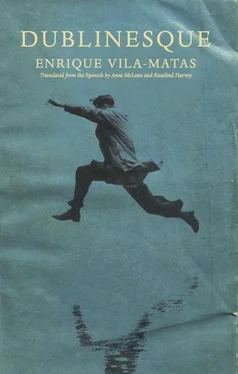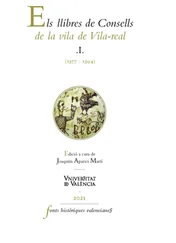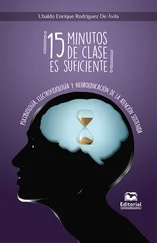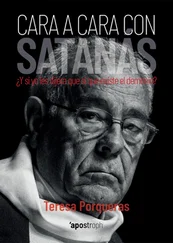Out on Calle Aribau, as he gets into a taxi, he realizes it’s about to start raining again. He had thought that after the great storm the rain would ease up. Maybe he could say this to the taxi driver? He hopes he’s not like the somewhat Shakespearean Portuguese taxi driver he met in Lyon, the most theatrical taxi driver in the world.
“It’s going to rain some more,” Riba says.
For a moment, he worries that the taxi driver is going to answer like the character from Macbeth and give the famous reply:
“Let it come down.”
But he doesn’t always — if ever — come across taxi drivers in Barcelona who speak like characters from Shakespeare.
“You said it,” replies the man.
In the taxi he finally finds time to glance through the day’s newspaper, and comes across some comments by Claudio Magris about The Infinite Journey , his latest book. He’s interested in whatever Magris writes. Almost too long ago to remember, he published his book Clarisse’s Ring , and has been good friends with the writer ever since.
The taxi glides along the apparently lifeless streets of Barcelona under a dirty light after the storm. He always worries absurdly that taxi drivers — it’s probably a very childish feeling — will see him barricaded behind his newspaper and get a false impression that, despite having already talked about the weather, he is not in the least bit interested in them and in what they might tell him about their lives of drudgery. He doesn’t know whether to bury himself in his newspaper and read Magris’s comments or talk to the driver and ask him something slightly odd: for example, if he’s been through the forest yet today, or if he’s played backgammon, or watched much television.
This fear that taxi drivers will think him so very indifferent means he sometimes turns the pages of his newspaper very furtively, but this isn’t the case today, since he’s just decided that nothing and no one will be able to distract him from Claudio Magris, whose article is about — a very striking double coincidence — Ulysses and Joyce and about precisely what he is doing now: going home.
He feels he should read this reappearance of Ulysses as a not at all insignificant coded message. As if secret forces — one of them Magris himself with his comments — are nudging him ever closer toward Dublin. He looks up and gazes out of the window; the taxi has just left Calle Aribau and is turning onto Vía Augusta. When they reach the intersection of Avenida Príncipe de Asturias and Rambla de Prat, he sees a young man on a street corner wearing an electric-blue Nehru jacket. He looks a lot like the man he saw earlier, standing in the rain in front of his parents’ house. Two Nehru jackets in such a short space of time is surely a coincidence.
He sees the young man only fleetingly because, almost immediately, as if fearing he’d been discovered, the man turns the corner and vanishes with astonishing speed.
How strange, thinks Riba, he’s disappeared almost too quickly. Although it’s not so strange really, he’s used to such things by now. He knows that sometimes people one didn’t expect at all can appear.
He goes back to reading the newspaper, he wants to concentrate on the interview with Magris, but ends up calling Celia on his cell phone to tell her he’s on his way home. The short conversation calms him down. When he hangs up, he thinks he could have told her that he’s seen two Nehru jackets in a short space of time. But no, maybe it was better just to have said he was coming home.
He goes back to the newspaper and reads that Claudio Magris believes Ulysses’s circular journey as he returns triumphantly home — Joyce’s traditional, classic, Oedipal, conservative journey — was replaced halfway through the twentieth century by a rectilinear journey: a sort of pilgrimage, a journey always moving forward, toward an impossible point in infinity, like a straight line advancing hesitantly into nothingness.
He could see himself now as a rectilinear traveler, but doesn’t want to create too many problems for himself, and decides that his journey through life is traditional, classic, Oedipal, conservative. He’s going home in a taxi, isn’t he? Doesn’t he go to his parents’ house whenever he comes back from a trip, and on top of that, visit them without fail every Wednesday? Isn’t he planning a trip to Dublin and the very center of Ulysses to then come home good-naturedly days later to Barcelona and to his parents and tell them about the trip? It’s hard to deny his life is following the pattern of a strictly orthodox circular journey.
“After Calle Verdi, you said?” asks the taxi driver.
“Yes, I’ll tell you where.”
When he finally gets home, he says hello to his wife and gives her a kiss. He smiles happily, like a simpleton. They have known or loved each other for thirty years, and except for very critical moments — such as during the final escalation of his drinking two years ago that ended in physical collapse — they haven’t grown too tired of living together. He tells her straight away that his father suffered an attack of melancholy and asked his son to explain the mystery of “the dimension.”
What dimension? she asks. He knew she might ask this. Well, the unfathomable dimension no less, he replies. They look at each other, and an air of mystery appears between them as well. The mystery his father was talking about? He can’t help but let his attention wander to other questions. Isn’t there essentially an unfathomable dimension between him and her?
“ Without asking who you were , / I fell in love . / And whoever you might be , / I will always love you ,” go the ridiculous, naïve lyrics to the song by Les Surfs that was playing when they met, and fell in love. Back then Celia looked more like Catherine Deneuve than anyone he had ever seen. Even the raincoats she wore that made her look sluttish recalled the ones Deneuve wore in The Umbrellas of Cherbourg .
And what do we know about ourselves, he wonders. Less and less every day, because on top of everything, Celia has been studying for some time now the possibility of becoming a Buddhist; she’s been contemplating for a few months what she calls the sweet eventuality . By now she’s almost convinced that she has within her the potential for reaching Nirvana, and believes she is close to seeing, with clarity and conviction, the true nature of existence and of life. It hasn’t escaped his notice that these first signs of Buddhism could end up being a big problem, in the same way that the escalation in his drinking was, two years ago, leading Celia seriously to consider leaving him. The fact is, he’d be in danger of being left on his own if one day he had the crazy idea of abusing alcohol again.
Now the two of them are motionless, as if both preoccupied with the same four questions, and this has paralyzed them: life, alcohol, Buddhism, and above all, their ignorance of each other.
They have been gripped by an unexpected coldness, as if they have suddenly realized that deep down they are strangers to each other, and to themselves, although — as well he knows — she is confident that Buddhism can lend her a hand and help her to take a spiritual step forward.
They smile nervously, trying to minimize the tension of this odd moment. Maybe he loves her so madly because she is someone he will never know everything about. It has always fascinated him, for example, that Celia is one of those women who never turn off taps properly. Dripping taps have been a constant in his marriage, in the same way — if such a comparison is possible — as his problems with alcohol.
He thinks he has always combined superbly well this relative ignorance about Celia with his total ignorance about himself. As he remarked once in an article for La Vanguardia : “I don’t know myself. The list of books I have published seems to have obscured forever the person behind the books. My biography is my catalog. But the man who was there before I decided to become a publisher is missing. I, in short, am missing.”
Читать дальше












